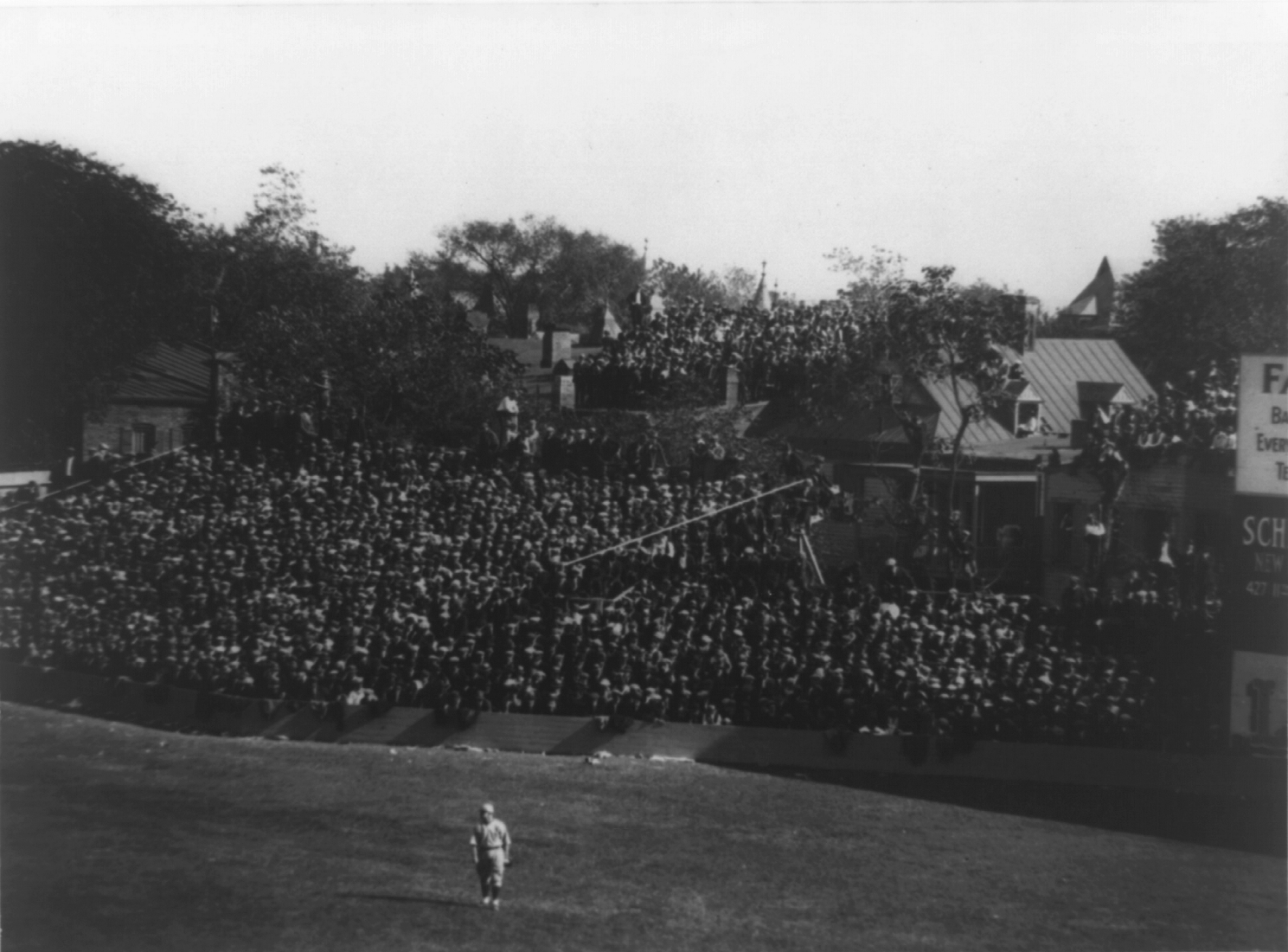|
Tom Brewer
Thomas Austin Brewer (September 3, 1931 – February 15, 2018) was an American professional baseball player. The right-handed pitcher appeared in 241 games over eight seasons (1954–1961) for the Boston Red Sox of Major League Baseball. He was listed as tall and . Although born in Wadesboro, North Carolina, Brewer was a lifelong resident of Cheraw, a nearby town located across the South Carolina border. He signed with the Red Sox in 1951 after attending Elon College, and in his first pro season won 19 of 22 decisions in the Class D North Carolina State League. It was his only season in minor league baseball. After two years of United States Army service during the Korean War,Larwin, Tom"Tom Brewer" Society for American Baseball Research Biography Project he made the Red Sox' varsity pitching staff for and would post seven straight seasons of double-digit wins as a Bosox hurler. His best season came in . Brewer went 19–9 ( .679) with career bests in complete games (15) a ... [...More Info...] [...Related Items...] OR: [Wikipedia] [Google] [Baidu] |
Pitcher
In baseball, the pitcher is the player who throws ("Pitch (baseball), pitches") the Baseball (ball), baseball from the pitcher's mound toward the catcher to begin each play, with the goal of out (baseball), retiring a batter (baseball), batter, who attempts to either make contact with the pitched ball or draw a base on balls, walk. In the numbering system used to record defensive plays, the pitcher is assigned the number 1. The pitcher is often considered the most important player on the defensive side of the game, and as such is situated at the right end of the defensive spectrum. There are many different types of pitchers, such as the starting pitcher, relief pitcher, middle reliever, left-handed specialist, lefty specialist, setup man, and the closing pitcher, closer. Traditionally, the pitcher also bats. Starting in 1973 with the American League and spreading to further leagues throughout the 1980s and 1990s, the hitting duties of the pitcher have generally been given over t ... [...More Info...] [...Related Items...] OR: [Wikipedia] [Google] [Baidu] |
Minor League Baseball
Minor League Baseball (MiLB) is a professional baseball organization below Major League Baseball (MLB), constituted of teams affiliated with MLB clubs. It was founded on September 5, 1901, in response to the growing dominance of the National League (baseball), National League and American League, as the National Association of Professional Baseball Leagues (NAPBL or NA). Minor League Baseball originated as simply the organization of lower tiers of professional baseball in the United States, comprising clubs that lacked the financial means to compete with the National League and later the American League. The association of minor leagues remained independent throughout the early 20th century, protected by agreements with the major leagues to ensure they were compensated when minor-league players were signed by major-league clubs. Later, Minor League Baseball evolved to be constituted entirely of farm team, affiliates of larger clubs, giving young prospects a chance to develop the ... [...More Info...] [...Related Items...] OR: [Wikipedia] [Google] [Baidu] |
Earned Run
In baseball, an earned run is any run that was fully enabled by the offensive team's production in the face of competent play from the defensive team. Conversely, an unearned run is a run that would not have been scored without the aid of an error or a passed ball committed by the defense; it is "unearned" in that it was, in a sense, "given away" by the defensive team. Earned and unearned runs count equally toward the game score; the difference is purely statistical. Both total runs and earned runs are tabulated as part of a pitcher's statistics, but earned runs are specially denoted because of their use in calculating a pitcher's earned run average (ERA), the number of earned runs allowed by the pitcher per nine innings pitched (i.e., averaged over a regulation game). Thus, in effect, the pitcher is held personally accountable for earned runs, while the responsibility for unearned runs is shared with the rest of the team. To determine whether a run is earned, the official sco ... [...More Info...] [...Related Items...] OR: [Wikipedia] [Google] [Baidu] |
Run (baseball)
In baseball, a run is scored when a player advances around first, second and third base and returns safely to home plate, touching the bases in that order, before three outs are recorded and all obligations to reach base safely on batted balls are met or assured. A player may score by hitting a home run or by any combination of plays that puts him safely "on base" (that is, on first, second, or third) as a runner and subsequently brings him home. Once a player has scored a run, they may not attempt to score another run until their next turn to bat. The object of the game is for a team to score more runs than its opponent. The Official Baseball Rules hold that if the third out of an inning is a force out of a runner advancing to any base then, even if another baserunner crosses home plate before that force out is made, his run does not count. However, if the third out is not a force out, but a tag out, then if that other baserunner crosses home plate before that tag out i ... [...More Info...] [...Related Items...] OR: [Wikipedia] [Google] [Baidu] |
Inning (baseball)
In baseball, softball, and similar games, an inning is the basic unit of play, consisting of two halves or frames, the "top" (first half) and the "bottom" (second half). In each half, one team bats until three outs are made, with the other team playing defense. A full baseball game is typically scheduled for nine innings, while softball games consist of seven innings, although this may be shortened due to weather, or extended if the score is tied at the end of the scheduled innings. The use of the term ''inning'' in baseball and softball contrasts with cricket and rounders, in which the term is '' innings'' in both singular and plural. Gameplay Each half-inning formally starts when the umpire calls "Play" or "Play ball". A full inning consists of six outs, three for each team, and, in Major League Baseball and most other adult leagues, a regulation game consists of nine innings. The visiting team bats in the first half-inning, the top of the inning, derived from the position ... [...More Info...] [...Related Items...] OR: [Wikipedia] [Google] [Baidu] |
Griffith Stadium
Griffith Stadium stood in Washington, D.C., from 1911 to 1965, between Georgia Avenue and 5th Street (left field), and between W Street and Florida Avenue NW. The site was once home to a wooden baseball park. Built in 1891, it was called Boundary Field, or National Park after the team that played there: the Washington Senators (1901–1960), Washington Senators/Nationals. It was destroyed by a fire in 1911. It was replaced by a steel and concrete structure, at first called National Park and then American League Park; it was renamed Clark Griffith Stadium for Washington Senators (1901–1960), Washington Senators owner Clark Griffith in 1923. The stadium was home to the American League Senators from 1911 in baseball, 1911 through 1960 Washington Senators season, 1960, and to an Washington Senators (1961–1971), expansion team of the same name for their 1961 Washington Senators season, first season in 1961 in baseball, 1961. The venue hosted the Major League Baseball All-Star Ga ... [...More Info...] [...Related Items...] OR: [Wikipedia] [Google] [Baidu] |
American League
The American League of Professional Baseball Clubs, known simply as the American League (AL), is the younger of two sports leagues, leagues constituting Major League Baseball (MLB) in the United States and Canada. It developed from the Western League (original), Western League, a minor league based in the Great Lakes region, Great Lakes states, which eventually aspired to Major League Baseball, major league status. It is sometimes called the Junior Circuit because it claimed Major League status for the 1901 season, 25 years after the formation of the National League (baseball), National League (the "Senior Circuit"). Since 1903, the American League champion has played in the World Series against the National League champion with only two exceptions: 1904, when the NL champion New York Giants (baseball), New York Giants refused to play their AL counterpart, and 1994, when a 1994–95 Major League Baseball strike, players' strike resulted in the cancellation of the Series. Through ... [...More Info...] [...Related Items...] OR: [Wikipedia] [Google] [Baidu] |
Shutout (baseball)
In Major League Baseball, a shutout (denoted statistically as ShO or SHO) refers to the act by which a single pitcher pitches a complete game and does not allow the opposing team to score a run. If two or more pitchers combine to complete this act, no pitcher is awarded a shutout, although the team itself can be said to have "shut out" the opposing team. The ultimate single achievement among pitchers is a perfect game, which has been accomplished 24 times, most recently by Domingo Germán of the New York Yankees on June 28, 2023. Until a rule change implemented by MLB in 2020, a perfect game was previously also, by definition, counted as a shutout. A no-hitter completed by one pitcher is also a shutout unless the opposing team manages to score through errors, base on balls, catcher's interference, dropped third strikes, or hit batsmen. The all-time career leader in shutouts is Walter Johnson, who pitched for the Washington Senators from 1907 to 1927. He accumulated 110 shut ... [...More Info...] [...Related Items...] OR: [Wikipedia] [Google] [Baidu] |
Complete Game
In baseball, a complete game (CG) is the act of a pitcher pitching an entire game without the benefit of a relief pitcher. A pitcher who meets this criterion will be credited with a complete game regardless of the number of innings played—pitchers who throw an entire official game that is shortened by rain will still be credited with a complete game, while starting pitchers who are relieved in extra innings after throwing nine or more innings will not be credited with a complete game. A starting pitcher who is replaced by a pinch hitter in the final half inning of a game will still be credited with a complete game. Complete games have become increasingly rare over the course of baseball history. In the early 20th century, pitchers completed almost all of the games they started, and they were generally expected to do so. In modern baseball, the feat is much more rare. Since 1975, no pitcher has thrown 30 or more complete games in a season; in the 21st century, only twice has any ... [...More Info...] [...Related Items...] OR: [Wikipedia] [Google] [Baidu] |
Winning Percentage
In sports, a winning percentage or Copeland score is the fraction of games or matches a team or individual has won. The statistic is commonly used in standings or rankings to compare teams or individuals. It is defined as wins divided by the total number of matches played (i.e. wins plus draws plus losses). A draw counts as a win. : \text = Discussion For example, if a team's season record is 30 wins and 20 losses, the winning percentage would be 60% or 0.600: : 60\% = \cdot100\% If a team's season record is 30–15–5 (i.e. it has won thirty games, lost fifteen and tied five times), and if the five tie games are counted as 2 wins, then the team has an adjusted record of 32 wins, resulting in a 65% or winning percentage for the fifty total games from: : 65\% = \cdot100\% In North America, winning percentages are expressed as decimal values to three decimal places. It is the same value, but without the last step of multiplying by 100% in the formula above. Furthermore, t ... [...More Info...] [...Related Items...] OR: [Wikipedia] [Google] [Baidu] |
Win–loss Record (pitching)
In baseball and softball, a win–loss record (also referred to simply as a record) is a statistic that indicates the number of wins (denoted "W") and losses (denoted "L") credited to a pitcher. For example, a 20–10 win–loss record would represent 20 wins and 10 losses. In each game, one pitcher on the winning team is awarded a win (the "winning pitcher") and one pitcher on the losing team is given a loss (the "losing pitcher") in their respective statistics. These pitchers are collectively known as the ''pitchers of record''. The designation of win or loss for a pitcher is known as a ''decision'', and only one pitcher for each team receives a decision. A starting pitcher who does not receive credit for a win or loss is said to have '' no decision''. In certain situations, another pitcher on the winning team who pitched in relief of the winning pitcher can be credited with a save, and holds can be awarded to relief pitchers on both sides, but these are never awarded to the ... [...More Info...] [...Related Items...] OR: [Wikipedia] [Google] [Baidu] |
Win (baseball)
Win or WIN most likely refers to: * A victory Win, Winning, WIN or Winner may also refer to: Arts and entertainment Film * '' Win!'', a 2016 American film Literature * ''Win'' (Coben novel), 2021 * WIN (pacifist magazine) * WIN (wrestling magazine), US Music * Win (band), a Scottish band * "Win" (song), by Jay Rock * "Win", a song by Ateez from the album '' Treasure EP.Fin: All to Action'' * "Win", a song by Brian McKnight from the album ''Gold'' * "Win", a song by David Bowie from the album '' Young Americans'' * "Win", a song by Stefflon Don and DJ Khaled from the mixtape '' Secure'' * Worldwide Independent Network (WIN), a coalition of independent music bodies, see Independent record label#Worldwide Independent Network (WIN)) Television and radio * Win Radio, a Philippine radio network ** 91.5 Win Radio, its flagship station * Win FM, an Indian radio station * WIN Television, an Australian television network ** WIN Corporation, the owner of WIN Television ** WIN N ... [...More Info...] [...Related Items...] OR: [Wikipedia] [Google] [Baidu] |




